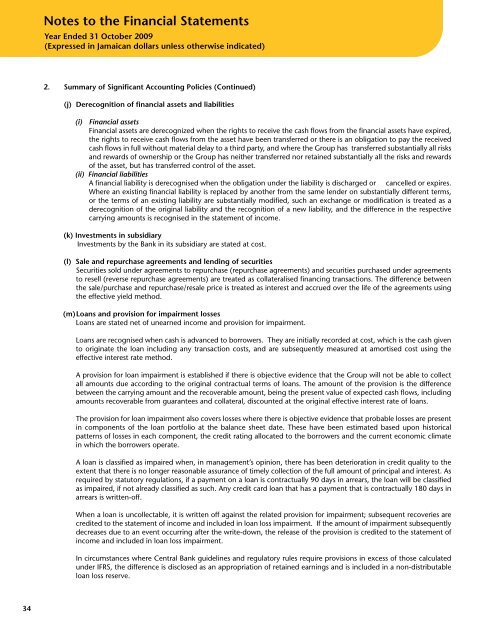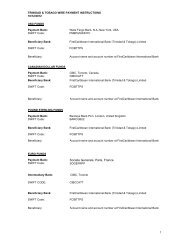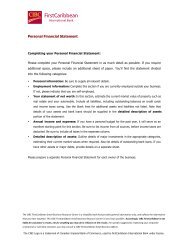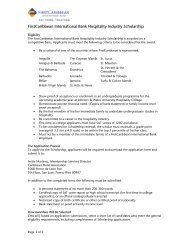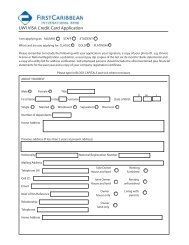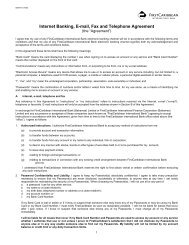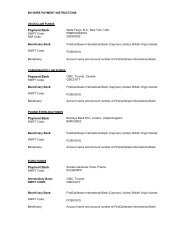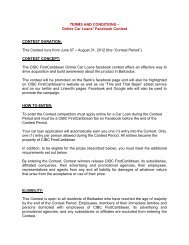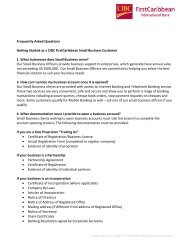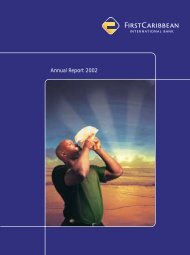(Jamaica) Limited - FirstCaribbean International Bank
(Jamaica) Limited - FirstCaribbean International Bank
(Jamaica) Limited - FirstCaribbean International Bank
You also want an ePaper? Increase the reach of your titles
YUMPU automatically turns print PDFs into web optimized ePapers that Google loves.
notes to the Financial Statements<br />
Year Ended 31 October 2009<br />
(Expressed in <strong>Jamaica</strong>n dollars unless otherwise indicated)<br />
2. Summary of Significant Accounting Policies (Continued)<br />
(j) Derecognition of financial assets and liabilities<br />
(i) Financial assets<br />
Financial assets are derecognized when the rights to receive the cash flows from the financial assets have expired,<br />
the rights to receive cash flows from the asset have been transferred or there is an obligation to pay the received<br />
cash flows in full without material delay to a third party, and where the Group has transferred substantially all risks<br />
and rewards of ownership or the Group has neither transferred nor retained substantially all the risks and rewards<br />
of the asset, but has transferred control of the asset.<br />
(ii) Financial liabilities<br />
A financial liability is derecognised when the obligation under the liability is discharged or cancelled or expires.<br />
Where an existing financial liability is replaced by another from the same lender on substantially different terms,<br />
or the terms of an existing liability are substantially modified, such an exchange or modification is treated as a<br />
derecognition of the original liability and the recognition of a new liability, and the difference in the respective<br />
carrying amounts is recognised in the statement of income.<br />
(k) Investments in subsidiary<br />
Investments by the <strong>Bank</strong> in its subsidiary are stated at cost.<br />
(l) Sale and repurchase agreements and lending of securities<br />
Securities sold under agreements to repurchase (repurchase agreements) and securities purchased under agreements<br />
to resell (reverse repurchase agreements) are treated as collateralised financing transactions. The difference between<br />
the sale/purchase and repurchase/resale price is treated as interest and accrued over the life of the agreements using<br />
the effective yield method.<br />
(m)Loans and provision for impairment losses<br />
Loans are stated net of unearned income and provision for impairment.<br />
Loans are recognised when cash is advanced to borrowers. They are initially recorded at cost, which is the cash given<br />
to originate the loan including any transaction costs, and are subsequently measured at amortised cost using the<br />
effective interest rate method.<br />
A provision for loan impairment is established if there is objective evidence that the Group will not be able to collect<br />
all amounts due according to the original contractual terms of loans. The amount of the provision is the difference<br />
between the carrying amount and the recoverable amount, being the present value of expected cash flows, including<br />
amounts recoverable from guarantees and collateral, discounted at the original effective interest rate of loans.<br />
The provision for loan impairment also covers losses where there is objective evidence that probable losses are present<br />
in components of the loan portfolio at the balance sheet date. These have been estimated based upon historical<br />
patterns of losses in each component, the credit rating allocated to the borrowers and the current economic climate<br />
in which the borrowers operate.<br />
A loan is classified as impaired when, in management’s opinion, there has been deterioration in credit quality to the<br />
extent that there is no longer reasonable assurance of timely collection of the full amount of principal and interest. As<br />
required by statutory regulations, if a payment on a loan is contractually 90 days in arrears, the loan will be classified<br />
as impaired, if not already classified as such. Any credit card loan that has a payment that is contractually 180 days in<br />
arrears is written-off.<br />
When a loan is uncollectable, it is written off against the related provision for impairment; subsequent recoveries are<br />
credited to the statement of income and included in loan loss impairment. If the amount of impairment subsequently<br />
decreases due to an event occurring after the write-down, the release of the provision is credited to the statement of<br />
income and included in loan loss impairment.<br />
In circumstances where Central <strong>Bank</strong> guidelines and regulatory rules require provisions in excess of those calculated<br />
under IFRS, the difference is disclosed as an appropriation of retained earnings and is included in a non-distributable<br />
loan loss reserve.<br />
34


